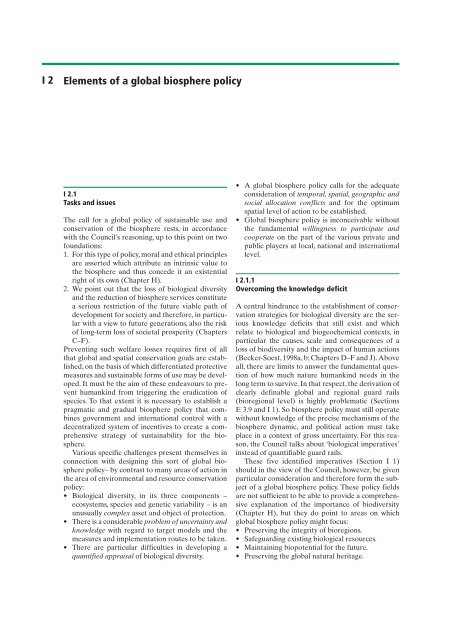Conservation and Sustainable Use of the Biosphere - WBGU
Conservation and Sustainable Use of the Biosphere - WBGU
Conservation and Sustainable Use of the Biosphere - WBGU
You also want an ePaper? Increase the reach of your titles
YUMPU automatically turns print PDFs into web optimized ePapers that Google loves.
I 2<br />
Elements <strong>of</strong> a global biosphere policy<br />
I 2.1<br />
Tasks <strong>and</strong> issues<br />
The call for a global policy <strong>of</strong> sustainable use <strong>and</strong><br />
conservation <strong>of</strong> <strong>the</strong> biosphere rests, in accordance<br />
with <strong>the</strong> Council’s reasoning, up to this point on two<br />
foundations:<br />
1. For this type <strong>of</strong> policy, moral <strong>and</strong> ethical principles<br />
are asserted which attribute an intrinsic value to<br />
<strong>the</strong> biosphere <strong>and</strong> thus concede it an existential<br />
right <strong>of</strong> its own (Chapter H).<br />
2. We point out that <strong>the</strong> loss <strong>of</strong> biological diversity<br />
<strong>and</strong> <strong>the</strong> reduction <strong>of</strong> biosphere services constitute<br />
a serious restriction <strong>of</strong> <strong>the</strong> future viable path <strong>of</strong><br />
development for society <strong>and</strong> <strong>the</strong>refore, in particular<br />
with a view to future generations, also <strong>the</strong> risk<br />
<strong>of</strong> long-term loss <strong>of</strong> societal prosperity (Chapters<br />
C–F).<br />
Preventing such welfare losses requires first <strong>of</strong> all<br />
that global <strong>and</strong> spatial conservation goals are established,<br />
on <strong>the</strong> basis <strong>of</strong> which differentiated protective<br />
measures <strong>and</strong> sustainable forms <strong>of</strong> use may be developed.<br />
It must be <strong>the</strong> aim <strong>of</strong> <strong>the</strong>se endeavours to prevent<br />
humankind from triggering <strong>the</strong> eradication <strong>of</strong><br />
species. To that extent it is necessary to establish a<br />
pragmatic <strong>and</strong> gradual biosphere policy that combines<br />
government <strong>and</strong> international control with a<br />
decentralized system <strong>of</strong> incentives to create a comprehensive<br />
strategy <strong>of</strong> sustainability for <strong>the</strong> biosphere.<br />
Various specific challenges present <strong>the</strong>mselves in<br />
connection with designing this sort <strong>of</strong> global biosphere<br />
policy– by contrast to many areas <strong>of</strong> action in<br />
<strong>the</strong> area <strong>of</strong> environmental <strong>and</strong> resource conservation<br />
policy:<br />
• Biological diversity, in its three components –<br />
ecosystems, species <strong>and</strong> genetic variability – is an<br />
unusually complex asset <strong>and</strong> object <strong>of</strong> protection.<br />
• There is a considerable problem <strong>of</strong> uncertainty <strong>and</strong><br />
knowledge with regard to target models <strong>and</strong> <strong>the</strong><br />
measures <strong>and</strong> implementation routes to be taken.<br />
• There are particular difficulties in developing a<br />
quantified appraisal <strong>of</strong> biological diversity.<br />
• A global biosphere policy calls for <strong>the</strong> adequate<br />
consideration <strong>of</strong> temporal, spatial, geographic <strong>and</strong><br />
social allocation conflicts <strong>and</strong> for <strong>the</strong> optimum<br />
spatial level <strong>of</strong> action to be established.<br />
• Global biosphere policy is inconceivable without<br />
<strong>the</strong> fundamental willingness to participate <strong>and</strong><br />
cooperate on <strong>the</strong> part <strong>of</strong> <strong>the</strong> various private <strong>and</strong><br />
public players at local, national <strong>and</strong> international<br />
level.<br />
I 2.1.1<br />
Overcoming <strong>the</strong> knowledge deficit<br />
A central hindrance to <strong>the</strong> establishment <strong>of</strong> conservation<br />
strategies for biological diversity are <strong>the</strong> serious<br />
knowledge deficits that still exist <strong>and</strong> which<br />
relate to biological <strong>and</strong> biogeochemical contexts, in<br />
particular <strong>the</strong> causes, scale <strong>and</strong> consequences <strong>of</strong> a<br />
loss <strong>of</strong> biodiversity <strong>and</strong> <strong>the</strong> impact <strong>of</strong> human actions<br />
(Becker-Soest, 1998a, b; Chapters D–F <strong>and</strong> J).Above<br />
all, <strong>the</strong>re are limits to answer <strong>the</strong> fundamental question<br />
<strong>of</strong> how much nature humankind needs in <strong>the</strong><br />
long term to survive. In that respect, <strong>the</strong> derivation <strong>of</strong><br />
clearly definable global <strong>and</strong> regional guard rails<br />
(bioregional level) is highly problematic (Sections<br />
E 3.9 <strong>and</strong> I 1). So biosphere policy must still operate<br />
without knowledge <strong>of</strong> <strong>the</strong> precise mechanisms <strong>of</strong> <strong>the</strong><br />
biosphere dynamic, <strong>and</strong> political action must take<br />
place in a context <strong>of</strong> gross uncertainty. For this reason,<br />
<strong>the</strong> Council talks about ‘biological imperatives’<br />
instead <strong>of</strong> quantifiable guard rails.<br />
These five identified imperatives (Section I 1)<br />
should in <strong>the</strong> view <strong>of</strong> <strong>the</strong> Council, however, be given<br />
particular consideration <strong>and</strong> <strong>the</strong>refore form <strong>the</strong> subject<br />
<strong>of</strong> a global biosphere policy. These policy fields<br />
are not sufficient to be able to provide a comprehensive<br />
explanation <strong>of</strong> <strong>the</strong> importance <strong>of</strong> biodiversity<br />
(Chapter H), but <strong>the</strong>y do point to areas on which<br />
global biosphere policy might focus:<br />
• Preserving <strong>the</strong> integrity <strong>of</strong> bioregions.<br />
• Safeguarding existing biological resources.<br />
• Maintaining biopotential for <strong>the</strong> future.<br />
• Preserving <strong>the</strong> global natural heritage.

















